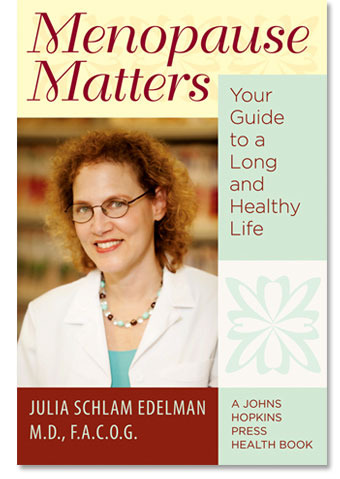Your Book & Its Niche
 By Julia Schlam Edelman MD, FACOG, NCMP
By Julia Schlam Edelman MD, FACOG, NCMP
Ten years ago, I set out to write a book for women 35 and over, with a focus on menopausal issues.
Not long ago, open discussion of menopause was taboo. Much has changed in the modern information era, and today women are inundated with facts and recommendations. All too often, the recommendations are contradictory. Women who try to keep up with the latest medical developments may become overwhelmed, frustrated, or even fearful.
My goal was to help women be informed and reassured, while enhancing their ability to manage their health. Based on my experience with patients, I expected that women who learned how their bodies change during midlife and beyond, would be positioned to make healthier choices.
Publishers did not find this compelling. They said I needed to have a stronger “platform.” This, I learned, is code for: “You are not a household name.” “You are not a famous actress whose cover photo will prompt women to follow your advice.” “You have not discovered a new cure for hot flashes, low sex drive, or aging.” Finally, “you have not been on Oprah.” As a board certified gynecologist and certified menopause practitioner with more than 25 years of experience caring for women, I watched with dismay as a dozen rejection letters from top publishers rolled in.
The breakthrough came when my literary agent suggested submitting the book proposal to Johns Hopkins University Press (JHUP). While I had heard the JHUP Executive Editor of Consumer Health speak at the Harvard CME Publishing Course for physicians, I had crossed JHUP off my list. After all, they had recently published “The Only Menopause Book You Will Ever Need.” Despite this, the JHUP editor and its physician board accepted the proposal and published Menopause Matters: Your Guide to a Long and Healthy Life in January, 2010.
Here are two examples of features that distinguish Menopause Matters from its competition. Perhaps they will help catalyze your thinking about positioning your book:
Discussing the rationale behind the medical recommendations
When discussing evidence regarding the use of natural and alternative remedies, prescription medications, and lifestyle changes, I provide a broad range of options. For example, readers are exposed to the risks and benefits of taking prescription hormones compared to taking bioidentical hormones, as well as discussing the implications of their lifestyle choices. There is no “one size fits all approach.” As readers, and their medical providers, are aware, “one size fits all” does not work when shopping for shoes, clothes, or medical advice.
Case Studies
Menopause Matters contains more than 50 short stories or “cases” that depict women with hot flashes, heart disease, breast lumps, thin bones, poor sleep, worse moods or low sex drive, and shows how these women make decisions with their physicians. This demonstrates how doctors and patients can work effectively together, and makes MM livelier and easier to read.
I hope that these examples help you with your book. If you would like to read a chapter of Menopause Matters: Your Guide to a Long and Healthy Life to see for yourself if I met my goals, please go to www.JuliaEdelmanMD.com, where the first chapter is posted, as well as the table of contents and four professional reviews.
About: Julia Schlam Edelman MD, FACOG, NCMP is a board certified gynecologist and certified menopause clinician with a private practice in Massachusetts. The North American Menopause Society selected her as their "2010 Menopause Practitioner of the Year".
Submit a guest post and be heard.





 Post a Comment
Post a Comment
Reader Comments